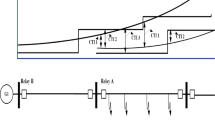Abstract
The coordination of directional overcurrent relays (DOCR) plays a very important role for maintaining security and enhancing reliability in the electrical power system. This paper presents the coordination of directional overcurrent relay using the modified particle swarm optimization (MPSO) technique. In order to improve the quality of a solution a local search algorithm is embedded to the original particle swarm optimization (PSO). Time dial settings had been optimized for directional overcurrent relays. In PSO technique on implementing the DOCR, being a highly constrained optimization problem that takes into consideration the linear programming. To handle such constraints a modification to PSO algorithm has been introduced. MPSO has achieved a lot of relaxation to its easy implementation, modesty and robustness. The proposed algorithm had been tested on IEEE 6-bus, IEEE 15-bus system and IEEE 30-bus system using MATLAB computer programming.










Similar content being viewed by others
References
Anderson PM (1999) Power system protection—part IV: reliability of protection systems. McGraw-Hill/IEEE Press, New York
Rao VVB, Rao KS (1988) Computer aided coordination of directional relays: determination of break points. IEEE Trans Power Deliv. 3(2):545–548
Wadood A, Kim CH, Khurshiad T, Farkoush SG, Rhee SB (2018) Application of a continuous particle swarm optimization (CPSO) for the optimal coordination of overcurrent relays considering a penalty method. Energies 11(4):869
Jenkins L et al (1992) An application of functional dependencies to the topological analysis of protection schemes. IEEE Trans Power Deliv 7(1):77–83
Wadood A et al (2018) An optimized protection coordination scheme for the optimal coordination of overcurrent relays using a nature-inspired root tree algorithm. Appl Sci 8:1664
Gholami Farkoush S et al (2018) Investigation and optimization of grounding grid based on lightning response by using ATP–EMTP and genetic algorithm. Complexity. 2018:8
Yu J, Kim CH, Wadood A, Khurshiad T, Rhee SB (2018) A novel multi-population based chaotic JAYA algorithm with application in solving economic load dispatch problems. Energies 11(8):1946
Kennedy J, Eberhart R (1995) Particle swarm optimization. In: Proceedings of the IEEE international conference on neural networks, vol 4. Perth, Australia, pp 1942–1948
Shi Y, Eberhart R (1998) A modified particle swarm optimizer. In: Evolutionary computation proceedings, 1998. IEEE world congress on computational intelligence. The 1998 IEEE international conference. IEEE, pp. 69–73
Eberhart R, Shi Y (2000) Comparing inertia weights and constriction factors in particle swarm optimization. Evolutionary Computation, Proceedings of the Congress 1:84–88
Park JB, Lee KS, Shin JR, Lee KY (2005) A particle swarm optimization for economic dispatch with non-smooth cost functions. IEEE Trans Power Syst 20(1):34–42
Mansour MM, Mekhamer SF, El-Kharbawe Nehad (2007) A modified particle swarm optimizer for the coordination of directional overcurrent relays. IEEE Trans Power Deliv 22(3):1400–1410
Urdaneta AJ, Pérez LG, Restrepo H (1997) Optimal coordination of directional overcurrent relays considering dynamic changes in the network topology. IEEE Trans Power Deliv 12(4):1458–1464
Zocholl SE et al (1989) Computer representation of overcurrent relay characteristics: IEEE committee report. IEEE Trans Power Deliv 4(3):1659–1667
Mirotznik MS (1999) Enhancing Matlab-to C ++ programming. IEEE Spectr 36(2):64–64
Eberhart R, Kennedy J (1995) A new optimizer using particle swarm theory. In Micro Machine and Human Science, 1995. MHS’95., proceedings of the sixth international symposium on (pp. 39–43). IEEE
Kim CH, Khurshaid T, Wadood A, Farkoush SG, Rhee SB (2018) Gray wolf optimizer for the optimal coordination of directional overcurrent relay. J Electr Eng Technol 13(3):1043–1051
Mansour MO, Abdel-Rahman TM (1984) Non-linear VAR optimization using decomposition and coordination. IEEE Trans Power Appar Syst 103(2):246–255
Bergh FVD, Engelbrecht AP (2001) Effects of swarm size on cooperative particle swarm optimizers. In: proceedings of the 3rd annual conference on genetic and evolutionary computation. Morgan Kaufmann Publishers Inc, Burlington, pp 892–899
Bouchekaraa HREH, Zellaguib M, Abidoc MA (2017) Optimal coordination of directional overcurrent relays using a modified electromagnetic field optimization algorithm. Appl Soft Comput Elsevier 54:267–283
Amraee T (2012) Coordination of directional overcurrent relays using seeker algorithm. IEEE Trans Power Deliv 27(3):1415–1422
Singh M, Panigrahi BK, Abhyankar AR (2013) Optimal coordination of directional overcurrent relays using teaching learning-based optimization (TLBO) algorithm. Int J Electr Power Energy Syst 50:33–41
Chelliah TR, Thangaraj R, Allamsetty S, Pant M (2014) Coordination of directional overcurrent relays using opposition based chaotic differential evolution algorithm. Int J Electr Power Energy Syst 55:341–350
Thangaraj R, Pant M, Deep K (2010) Optimal coordination of overcurrent relays using modified differential evolution algorithms. Eng Appl Artif Intell 23(5):820–829
Zellagui M, Hassan HA (2015) A hybrid optimization algorithm (IA-PSO) for optimal coordination of directional overcurrent relays in meshed power systems. Wseas Trans Power Syst 10:20–250
Alipour M, Teimourzadeh S, Seyedi H (2015) Improved group search optimization algorithm for coordination of directional overcurrent relays. Swarm Evolut Comput Elsevier 23:4–49
Noghabi AS, Mashhadi HR, Sadeh J (2010) Optimal coordination of directional overcurrent relays considering different network topologies using interval linear programming. IEEE Trans Power Deliv 25:1348–1354
Noghabi AS, Sadeh J, Mashhadi HR (2018) Parameter uncertainty in the optimal coordination of overcurrent relays. Int Trans Electr Energy Syst 28(7):e2563
Hajjar A (1999) Adaptive coordination of overcurrent relays in power distribution networks. Diss. M. Sc thesis in Electrical Engineering, Ain Shams University, 1999
Acknowledgements
This research was supported by Korea Electric Power Corporation, grant number (R17XA05-38).
Author information
Authors and Affiliations
Corresponding author
Rights and permissions
About this article
Cite this article
Khurshaid, T., Wadood, A., Farkoush, S.G. et al. Modified Particle Swarm Optimizer as Optimization of Time Dial Settings for Coordination of Directional Overcurrent Relay. J. Electr. Eng. Technol. 14, 55–68 (2019). https://doi.org/10.1007/s42835-018-00039-z
Received:
Revised:
Accepted:
Published:
Issue Date:
DOI: https://doi.org/10.1007/s42835-018-00039-z




